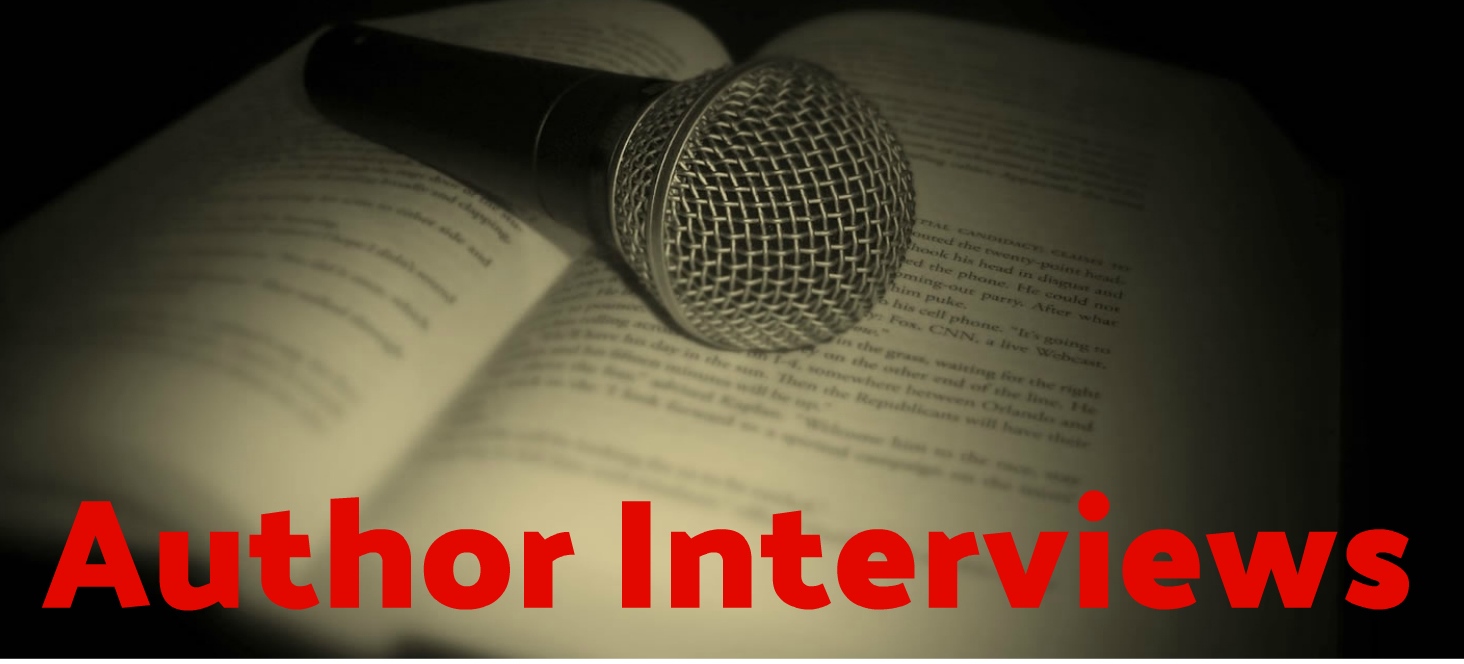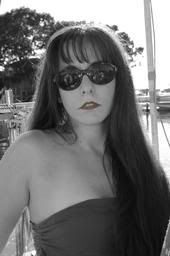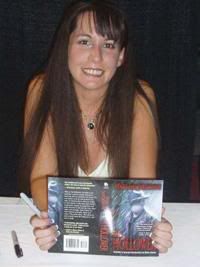
In-Depth Discussions with Today's Darkest Talents
Of Sequels and Success: An Interview with Mary SanGiovanni
By, Derek Clendening
To Mary SanGiovanni, anyone can relate to the titular creature of her Bram Stoker Award-nominated debut novel, The Hollower, even if they’re not connoisseurs of the dark and horrific. In fact, one of her friends claims a Hollower sighting,  allegedly occurring on a dark and lonely night when her television went fuzzy. Physically, the blank-faced creature wearing the trench coat and fedora might’ve been a figment of her imagination. But, emotionally and spiritually, the Hollower might’ve been raring to attack her at her most vulnerable moment. In this sense, Mary distinguishes her monster from typical horror monsters, as the Hollower relies on human emotions and spirits for fuel. When Dark Scribe Magazine phoned Mary for an in-depth chat about monsters, contributor Derek Clendening set out to learn what a Hollower is, what it does, and what readers can expect in the sequel Found You.
allegedly occurring on a dark and lonely night when her television went fuzzy. Physically, the blank-faced creature wearing the trench coat and fedora might’ve been a figment of her imagination. But, emotionally and spiritually, the Hollower might’ve been raring to attack her at her most vulnerable moment. In this sense, Mary distinguishes her monster from typical horror monsters, as the Hollower relies on human emotions and spirits for fuel. When Dark Scribe Magazine phoned Mary for an in-depth chat about monsters, contributor Derek Clendening set out to learn what a Hollower is, what it does, and what readers can expect in the sequel Found You.
Kicking off the conversation with some light banter about monsters, DSM was eager to know what inspired her faceless ghoul.
“I’ve always loved monsters,” she says, “but I wanted to write about a monster that was different from your basic monster archetype. You know…the kind of monster that’s going to eat you in the darkness.”
After racking her brain for ideas, she turned to her faithful first reader - dear old dad. Conscious of her stock in his opinion, she was determined to present new ideas to him until she had a winner. But that meant returning to the drawing board a few times.
“So, I ran the idea past him,” she continues, “and I asked, ‘What can I do that hasn’t already been done?’ He told me that I needed to come up with something completely different from what everyone has already seen.”
In an age where most possibilities seem exhausted, Mary chose to write about a monster that could strike a nerve in people of any age, gender, class or race. Thus, The Hollower and its titular creature were born.
In molding the Hollower, Mary says that she aimed to create a monster that is completely foreign to the human  condition. This means that her monster is devoid of the emotions, remorse, sympathy and compassion that are common to us. To that end, she says that the Hollower uses these qualities against her characters. Whenever her more troubled characters feel as though they are in a safe place emotionally and spiritually, and progressing in their lives, the Hollower is prepared to utilize those human weaknesses and to haunt them from a distance. She’s quick to add that “the Hollower is never close to us unless it’s using something against us.”
condition. This means that her monster is devoid of the emotions, remorse, sympathy and compassion that are common to us. To that end, she says that the Hollower uses these qualities against her characters. Whenever her more troubled characters feel as though they are in a safe place emotionally and spiritually, and progressing in their lives, the Hollower is prepared to utilize those human weaknesses and to haunt them from a distance. She’s quick to add that “the Hollower is never close to us unless it’s using something against us.”
With her father’s seal of approval on her monster, she proceeded to sketch out the plot for The Hollower. Next came the question of physicality - what the Hollower should look like. To Mary, a Hollower is a person who isn’t finished yet.
“If you were going to mold a person and give them no distinguishing characteristics like eye color, hair or tattoos,” she explains, “you’d get the Hollower.” Figuring that her monster could take on any face and any voice, she left the Hollower’s identity open for interpretation, adding “The artist who did the [Leisure] cover really captured what I’d imagined.”
With the release of Bryan Smith’s Queen of Blood and Brian Keene’s Ghost Walk from Leisure, horror lit is seeing more and more sequels. For Mary, a sequel to The Hollower was never in the cards, but she says that she didn’t realize how powerful a sequel could be until she started writing it. DSM was quick to ask what prompted her to write a sequel if she’d never envisioned one.
“My agent told me that we could sell a sequel if I wrote one, so I set to work on it. My problem [at the end of The Hollower] was that the characters’ resolutions ended up not being real resolutions, and a sequel gave me a chance to tie up those loose ends.”
 She cites Dave, her protagonist, as being the character whose story is left the most open-ended, pointing out that the first book leaves him in a state where he’s safe, but not truly healed. In Found You, he faces a difficult truth about himself and falls into a state of regression. At the outset of the novel, the reader will discover that Dave hasn’t changed enough through the course of the first book to be truly healed. Mary adds that Dave deteriorates back to the most horrific personal states that he battled in The Hollower. “He drinks more,” she says, “and he’s in a bad place in society. His job barely factors into the book, but he is working; he’s just not in a great place.”
She cites Dave, her protagonist, as being the character whose story is left the most open-ended, pointing out that the first book leaves him in a state where he’s safe, but not truly healed. In Found You, he faces a difficult truth about himself and falls into a state of regression. At the outset of the novel, the reader will discover that Dave hasn’t changed enough through the course of the first book to be truly healed. Mary adds that Dave deteriorates back to the most horrific personal states that he battled in The Hollower. “He drinks more,” she says, “and he’s in a bad place in society. His job barely factors into the book, but he is working; he’s just not in a great place.”
That not-so-great place is a province where so many of her original cast of characters find themselves, and it is where they are the most vulnerable to the Hollower.
“I realized that many of these characters had come to this place where they were content with themselves,” she explains, “but they hadn’t experienced enough change to make their new selves stick. Writing a sequel helped with my character and story arcs and, by the end of Found You, they resolve to the kind of change they need to experience to properly heal.” She adds that “the ending is unusual, but it’s the only way I could imagine that the story would end.”
Though sequels are more typical in horror cinema than novels, Mary decided to take a different approach. To her, a sequel sounded too easy to lump in with Freddy, Jason or Michael Myers, who either terrorize the same characters or new batch of victims in a fresh setting.
“I thought about that while I was writing the second book,” she says, “and I realized that it’s a whole new Hollower. The idea of a sequel is a bit misleading, because it implies that the same Hollower has returned.” This Hollower is much more sadistic, she promises, and does target some characters from the first novel. Some of the new characters are connected to the originals, even if Found You does not encompass the entire original cast.
Given the numerous forms that a horror story can take, Mary does not feel bound to writing just supernatural horror. In fact, she dreams of spreading her wings and dabbling in other forms of writing, including themes outside of the genre.
“I’ve always wanted to write a Lovecraftian epic, or science fiction, or even a western” she says. “If I can get to a point where I can work on two books at once, I would write a supernatural horror novel, and then write a thriller novel on the side. It wouldn’t be your basic story about cops hunting down a serial killer, but something along those lines.”
Considering how removed the Lovecraftian epic, and other speculative genres are from what she’s used to writing, DSM asked her if she feels limited by her current work. To her, the books haven’t limited her, but rather have satisfied her level of patience.
“I don’t have the patience to write something over 100, 000 words, and I’m not patient enough to write one of those thick fantasy books that are broken down into a series,” she says. “Most of the stuff that I write falls into the 80, 000 words range, which is what Leisure wants anyway. I think that I would run out of steam if I wrote a story that runs any longer than that.”
Before the end our chat, Mary expands a bit on her roots, where she honed her writing chops, and how she arrived at  where she is today. She tells DSM that reading and writing every day is a given, but that she was also helped by some more formal education. Seton Hill, a Catholic college near Pittsburgh, tops her list in terms of influences. In fact, she credits her enrollment as the smartest decision in her adult life. Her decision to enroll at Seton Hill stemmed from a desire to switch jobs, and knowing that an upgraded degree could land her a better-paying job.
where she is today. She tells DSM that reading and writing every day is a given, but that she was also helped by some more formal education. Seton Hill, a Catholic college near Pittsburgh, tops her list in terms of influences. In fact, she credits her enrollment as the smartest decision in her adult life. Her decision to enroll at Seton Hill stemmed from a desire to switch jobs, and knowing that an upgraded degree could land her a better-paying job.
“So I gave it a shot,” she says, “and I checked out what degrees I could do. All I’ve ever wanted to do is to write. Also, it would have been difficult for me to go to classes, say, on a Tuesday and a Thursday. So, I looked at two creative writing programs that I could do and that would allow me to write my novel as my thesis.” For Mary, that thesis was The Hollower. She continues, “Seton Hill caught my attention because it wasn’t just a creative writing MA, but it was a genre fiction MA, so no one would look down on me for being a horror writer.”
With instructors like Gary Braunbeck and Mike Arnzen, how could she go wrong? Their expert guidance helped her to pitch and sell The Hollower to Leisure, and she believes that the school loaned her a great deal of credibility. Since the program’s mission was to write a publishable novel, suffice to say she passed her MA with flying colors. She adds that everyone there was extremely happy for her, and that her fellow students were a great support system. “If writing is something you want to do, then I definitely recommend Seton Hill.”
The future is looking busy for Mary, as several of her short stories will be appearing in various magazines and anthologies, including the second volume of Legends of the Mountain State. Her current major writing project, which she hopes to sell to Leisure, is tentatively titled The Funeral Parties.
 Mary will be busy promoting the new book, touring the New York, New Jersey and Massachusetts areas this fall. If you’d like to meet her in person and have your copies of Found You and The Hollower signed, she welcomes the opportunity to meet with her readers.
Mary will be busy promoting the new book, touring the New York, New Jersey and Massachusetts areas this fall. If you’d like to meet her in person and have your copies of Found You and The Hollower signed, she welcomes the opportunity to meet with her readers.
In the meantime, Mary will keep plugging away, forming new monsters in her head perfect for those dark, rainy nights when the TV goes fuzzy and you glimpse something taking shape in the static.
To learn more about Mary SanGiovanni, visit her official author website and MySpace page.
Purchase The Hollower
Purchase Found You



